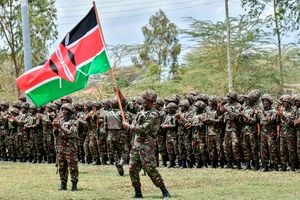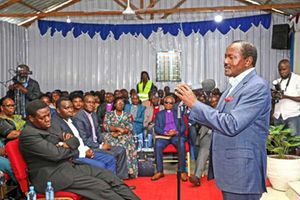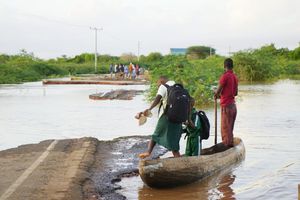New drive banks on men, boys to end GBV in Migori, Homa Bay

Kuria elders sign a deal to support the fight against FGM in Migori County. The Forum for African Women Educationists (Fawe Kenya) is now involving men and boys in the fight against gender-based violence in Migori and Homa counties.
What you need to know:
- Migori County grapples with female genital mutilation that targets teenage girls in Kuria East and Kuria West.
- In Homa Bay, cases of defilement and teenage pregnancies have been on the rise.
Whenever sexual and gender-based violence (SGBV) cases are reported in Homa Bay and Migori, different nongovernmental organisations deploy their officers in the affected areas to implement remedial programmes.
The two counties host multiple organisations that work towards ending social vices affecting communities around the lake region. In Migori, they mainly fight female genital mutilation (FGM) that affects teenage girls in Kuria East and Kuria West. In Homa Bay, they fight defilement and teenage pregnancies.
But despite their interventions, the two counties still struggle to reduce prevalence of some of the vices that affect the wellbeing of women and teenage girls. Some senior government officials are on record saying they do not see the benefits of the operations of some of the organisations as their interventions have no impact.
Most of the implementing agencies have always applied the same concept when working towards creating safe spaces for girls. Focus has always been directed to one particular group: females.
The method has always involved teenage girls and women in workshops and mentorship programmes where they are sensitised to their rights and freedom.
Some of the empowered girls and women end up becoming victims of the same vices, leading to the rise in triple threat – teen pregnancies, defilement and HIV infection.
On Saturday last week, the Forum for African Women Educationists (Fawe) Kenya took a different approach to solving the problems to enable girls in the two counties to realise their education potential.
Fawe Kenya officials discovered that some victims are helpless and cannot defend themselves despite being empowered. So it decided to bring on board men, who are mostly accused of being perpetrators.
'I care about her'
Chief Executive Officer Teresa Otieno says her organisation decided to engage men and boys in a campaign dubbed ‘I care about her’.
“We thought it wise to involve boys and men to help us eradicate issues that are keeping our girls away from school,” she says.
Fawe Kenya organised three-day training where men from different sectors and boys from primary and secondary schools were told of how they can get involved in helping teenage girls realise their dream. Also present were boda boda riders, who are accused of fuelling the vices when they ferry girls and women to traps or directly get involved when they pounce on them as they ferry them.
Some of the issues the group covered include teenage pregnancy, child marriage, defilement, menstrual cycle and poverty.
“Basically, the campaign is meant to encourage men and boys to help in eradicating issues that affect our girls from achieving their potential,” Ms Otieno says.
The organisation is optimistic that their approach will work and help the government eradicate SGBV by 2026. During the training, most participants said incest is the main challenge for teenage girls. It was revealed that most men violate the sexual rights of their relatives.
The men were also taught about reproductive health and urged to encourage girls to resist sexual advances from their peers and from adult men.
“The training also focused on how to seek services from health centres so that we can be supportive to the girl child," Ms Otieno says.
Ms Everline Mahiri, the wife of Migori deputy governor, lauded Fawe Kenya for the new approach. She describes it as an innovative strategy that will have a huge impact in the counties. Migori is among counties where harmful cultural traditions hurt teenage girls.
Fawe Kenya has been partnering with Migori to help eradicate the vices. “We are in full support of this initiative and will ensure we do everything to ensure it is successful,” Ms Mahiri said.
Migori is currently developing a gender strategy plan that will offer guidance to different organisations on how to work towards fighting the vices. Once passed, it will offer pathways to a joint war on communal challenges.
Ms Mahiri says empowerment of men is one of the ways the government can solve cases of gender violence and sexual rights abuse. “We should be ready to change the normal behaviour that leads us to some of the situations that some couples find themselves in.”
Suba deputy county commissioner Sebastian Okiring says national government officials are willing to work with Fawe Kenya to implement the initiative.
He said the information will be shared with chiefs, their assistants and village elders so that the information reaches most people.
“We want to mainstream the campaign in all the activities they undertake. We aspire to be an industrialised nation, but that cannot be achieved if we do not address the threats that our teenage girls face," Mr Okiring said, calling on other national government departments to support the campaign.
Retaining girls in school
Homa Bay sub-county education director Ziada Osano says the new approach will retain girls in school. She said the government has a policy that all learners be retained in school, including teenage mothers.
Ms Osano says involving boys and men in the campaign will help fight the stigma faced by girls whose rights are violated.
Migori county education executive Betty Samburu describes the concept as a game changer. She says her county was greatly affected during the Covid-19 crisis, where gains that some girls had made in their education were erased when they were defiled, impregnated, infected with HIV or taken for FGM.
Ms Samburu says the gender strategic plan being developed by the county government will ensure effective coordination of programmes to end the vices.
“Some organisations working towards ending the vices do not do it under the set structures. The policy will, however, ensure coordination from the top gender agencies,” she says.
Homa Bay Woman Representative Joyce Osogo says mentoring boys is commendable as it enables them to take the lead in protecting girls. She further called on girls to address decently when they are in public.





